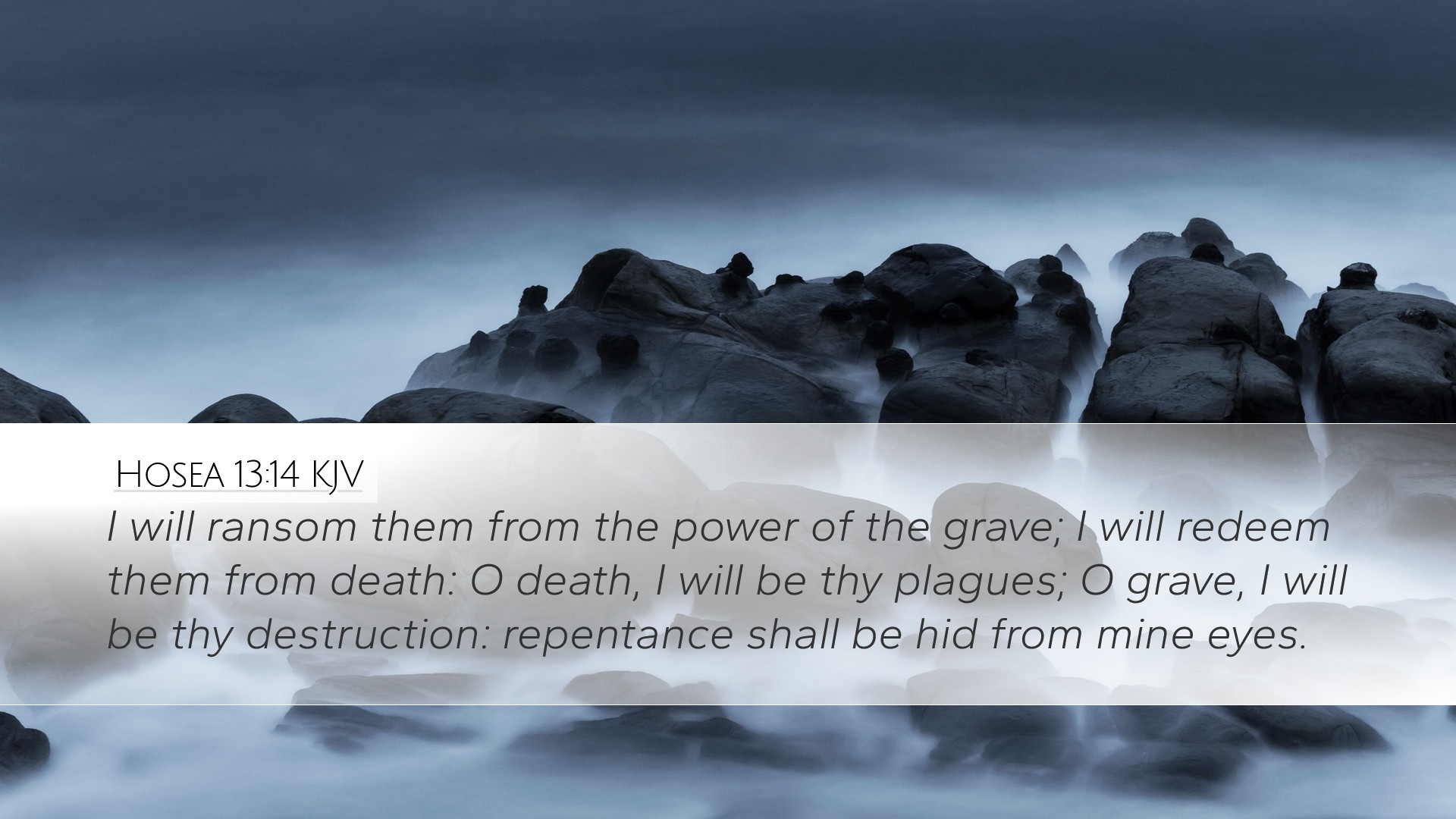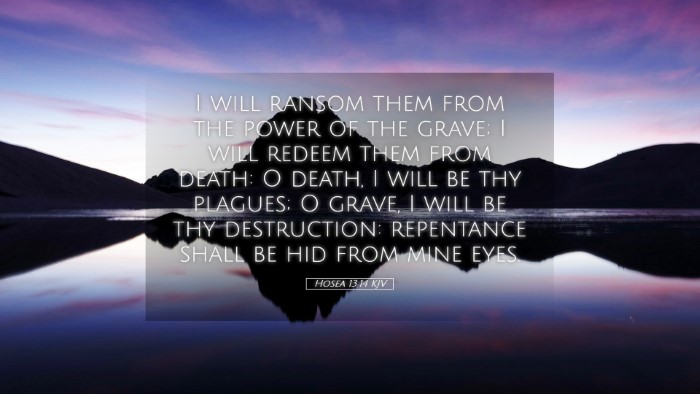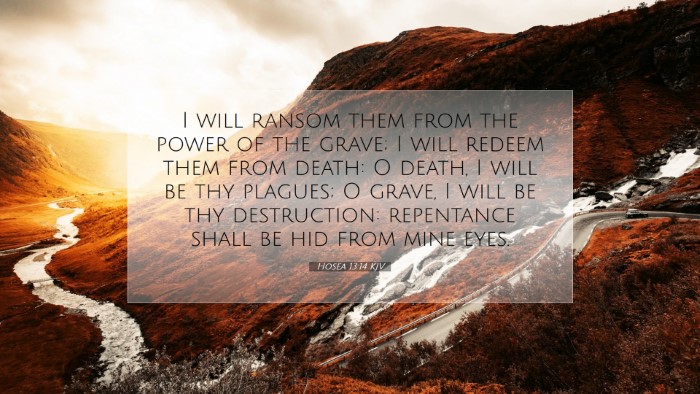Old Testament
Genesis Exodus Leviticus Numbers Deuteronomy Joshua Judges Ruth 1 Samuel 2 Samuel 1 Kings 2 Kings 1 Chronicles 2 Chronicles Ezra Nehemiah Esther Job Psalms Proverbs Ecclesiastes Song of Solomon Isaiah Jeremiah Lamentations Ezekiel Daniel Hosea Joel Amos Obadiah Jonah Micah Nahum Habakkuk Zephaniah Haggai Zechariah MalachiHosea 13:14
Hosea 13:14 KJV
I will ransom them from the power of the grave; I will redeem them from death: O death, I will be thy plagues; O grave, I will be thy destruction: repentance shall be hid from mine eyes.
Hosea 13:14 Bible Commentary
Bible Commentary on Hosea 13:14
Verse Context: Hosea 13:14 states, "I will ransom them from the power of the grave; I will redeem them from death: O grave, I will be thy plagues; O death, I will be thy destruction: repentance shall be hid from mine eyes." This verse reflects God's promise of redemption and the ultimate defeat of death, showcasing His mercy and power.
Introduction
In this poignant verse from the book of Hosea, we find a profound declaration of God's sovereignty over life, death, and redemption. This commentary aims to integrate insights from public domain scholars including Matthew Henry, Albert Barnes, and Adam Clarke, providing a comprehensive understanding of this significant scripture.
Commentary Insights
Matthew Henry's Commentary
Matthew Henry highlights the themes of redemption and divine sovereignty in this verse. He emphasizes that the promise of ransom signifies God’s power to deliver His people from all forms of bondage, including spiritual death.
Henry remarks on the metaphorical language employed, noting that God’s declaration against the grave is a demonstration of divine authority. He asserts that while death seems formidable, God's reassurance that He will "ransom them from the power of the grave" points to His ultimate victory over death, encouraging believers in the hope of eternal life.
Albert Barnes' Commentary
Albert Barnes approaches Hosea 13:14 by illustrating the themes of hope and deliverance. He comments on the phrase "I will redeem them from death," suggesting that this indicative of God's covenant with Israel, where He assures the faithful of salvation and eventual resurrection.
Barnes contributes to the eschatological perspective by interpreting this verse as prophetic of Christ’s resurrection, wherein the ultimate victory over death is realized. He posits that this is a significant theme in Christian theology, highlighting the transition from death to eternal life through faith.
Adam Clarke's Commentary
Adam Clarke offers a thorough exegesis of the text, emphasizing the seriousness with which God regards life and death. Clarke notes that the imagery of the grave and death should not merely be seen in a literal sense but symbolizes the state of sin and separation from God.
Clarke presents the notion of divine compassion and impending judgment intertwined within the promise of redemption. He observes that while repentance may seem concealed, God's readiness to restore those who turn back to Him is never hidden.
Theological Reflections
The commentary from these scholars leads us to several theological reflections regarding salvation, redemption, and God's character:
- Redemption and Hope: God’s promise of redemption provides believers with hope amid despair, affirming the assurance of salvation through faith in Jesus Christ.
- The Nature of Death: Understanding death as not simply a physical end but a separation from God illuminates the gravity of sin and the necessity of divine intervention for restoration.
- God’s Sovereignty: The assurance that God will deliver His people reinforces His sovereignty and ultimate authority over all creation, including death itself.
- Repentance: The mention of repentance in the closing phrase highlights the conditional aspect of restoration—emphasizing the call to turn from sin and seek reconciliation with God.
Practical Applications
In light of Hosea 13:14, several practical applications emerge for pastors, students, theologians, and scholars:
- Evangelistic Encouragement: This verse serves as a potent reminder of God's eagerness to redeem the lost, encouraging evangelistic efforts and the proclamation of the Gospel.
- Pastoral Care: Understanding God’s promise of redemption can provide comfort and hope to those dealing with loss and grief, reassuring them of the victory over death.
- Theological Discourse: Engaging in discussions about life, death, and redemption encourages deeper theological understanding and reflects on Christ's victory over sin and death.
- Calls to Repentance: Promoting a message of repentance in congregations remains essential, reminding the faithful of their need for forgiveness and the transformative power of God's grace.
Conclusion
Hosea 13:14 encapsulates a significant theological promise that transcends its immediate context, revealing God's nature as a redeemer. The insights from Matthew Henry, Albert Barnes, and Adam Clarke present a multifaceted understanding of the text, emphasizing redemption, hope, and the divine authority over death. As believers, we are encouraged to engage with this profound promise, recognizing God's unwavering commitment to His people and the promise of eternal life.


